College of Agriculture & Environmental Sciences
Unisa @ 150: Advanced climate research centre launched
The College of Agriculture and Environmental Sciences (CAES) recently launched its Centre of Excellence: Adaptation and Resilience in a highly anticipated "PracAdemic" event held from 8 to 10 May 2023.
This event brought together academics from various disciplines, alongside communities impacted by climate risks from across South Africa and the African continent. The centre is set to be globally recognised for providing innovative research, best practices, education, leadership, support, and training in the area of adaptation and resilience.
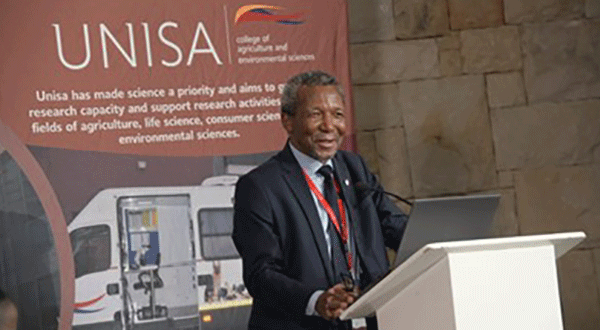
Executive Dean of CAES, Prof Solomon Magano, giving the opening address
The centre aims to promote social change by fostering collaboration between communities, academics, industry leaders and government officials. As a Pan-African epicentre of expertise, the centre's mission is to draw upon diverse knowledge systems to develop innovative solutions to societal challenges. This will include advancing research in specific fields to support communities and social change outcomes, promoting collaboration and networking among various social actors, transferring knowledge from research to practice, and developing practical tools and guidelines for practitioners to use.
The launch of the centre was a grand event attended by international and national delegates, including guest speakers from various sectors. The ribbon-cutting ceremony was performed by Unisa's Principal and Vice-Chancellor, Prof Puleng LenkaBula, and Vice-Principal: Research, Postgraduate Studies, Innovation and Commercialisation, Prof Thenjiwe Meyiwa.
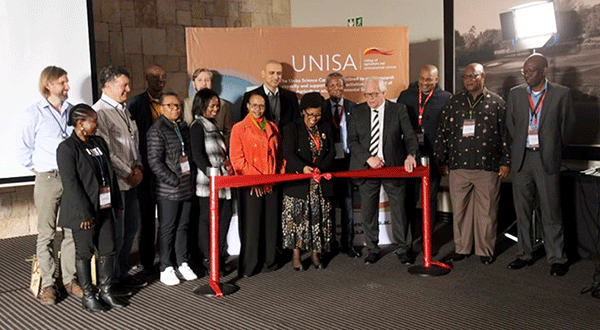
Ribbon-cutting ceremony at the opening of the Centre of Excellence
The event featured presentations by distinguished national and international speakers. These included presentations by Prof Eelco Dykstra, Director of Daily Impact Emergency Management (DIEM) in the Netherlands; Ian Widdop, from Disaster Aid Risk Reduction, Rotary New Dawn; Dr Johnny Stormonth-Darling from the United Kingdom Urban AgriTech; Alize le Roux, Senior Researcher at the Institute for Security Studies; Prof Catherine Sutherland, from the University of KwaZulu-Natal; and Chetan Mistry, Xylem Strategy and Marketing Manager.
Other organisations in attendance included the Kingdom of the Embassy of The Netherlands, the Department of International Relations and Cooperation, the Climate and Disaster Resilience Fund, and the University of Copenhagen.
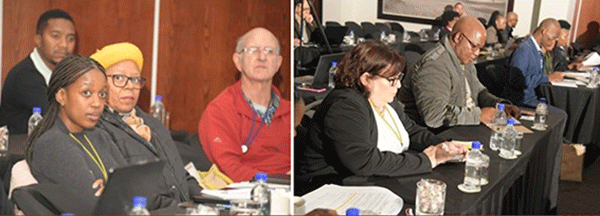
Delegates listening to the informative presentations
The event welcomed communities from KwaZulu-Natal, Gauteng, the Eastern Cape and the Western Cape, who presented their respective climate risk challenges. The event was an opportunity for critical discussions and constructive dialogue on innovative solutions to address challenges facing African communities. Practical group work was conducted on the second and third days, with academics and communities working together to explore challenges in society and develop research projects to provide concrete recommendations. Delegates were also able to visit display booths and stands set up by academics to understand the expertise of various academic disciplines and how they could be paired with communities for assistance based on research expertise.
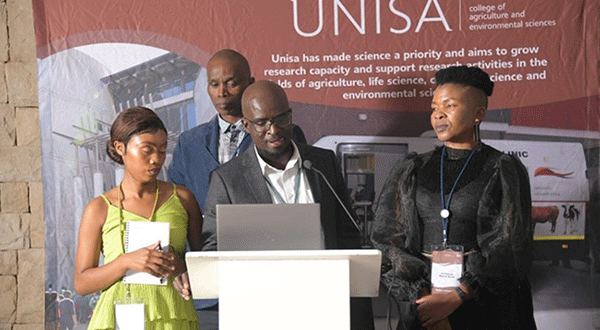
Community members from Limpopo speaking about the challenges of climate change
On the final day of the event, academic and community teams presented some of the pressing challenges facing communities, along with recommendations to assist in solving these challenges.
The event ended with a phenomenal performance by the Soweto Orchestra, playing hits and tunes to the amazement and delight of delegates who danced and sang to celebrate both the launch of the centre and Unisa's 150th anniversary.
As Unisa continues to strive to be a higher education centre of excellence, contributing to the success and opportunities for the marginalised, as well as being a player in the global knowledge arena with an impact on social change, the Centre of Excellence will no doubt have a pivotal role to play in this regard, and its launch was an incredible success.
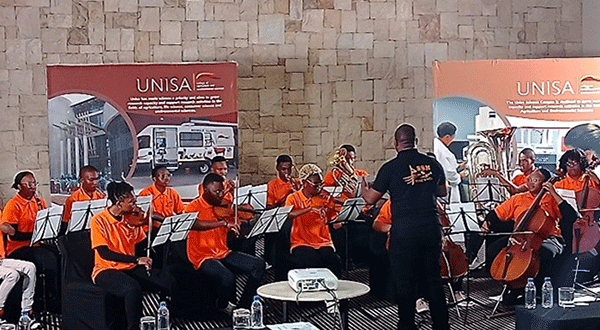
The Soweto Orchestra
#Unisa150
* By Prof Leonard Llewellyn, School of Ecological and Human Sustainability, College of Agriculture and Environmental Sciences
Publish date: 2023/05/17

 Unisa co-hosts G20 community outreach in the Eastern Cape
Unisa co-hosts G20 community outreach in the Eastern Cape
 Unisans gain membership of prestigious science academies
Unisans gain membership of prestigious science academies
 Advocating for disability transformation through servant leadership
Advocating for disability transformation through servant leadership
 Unisa Press continues to illuminate the publishing space
Unisa Press continues to illuminate the publishing space